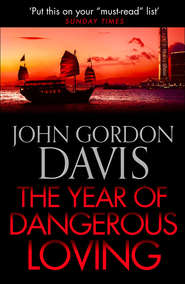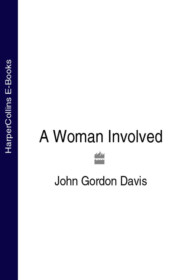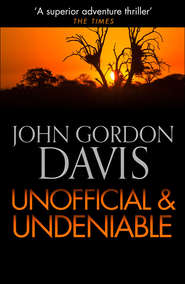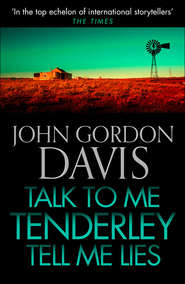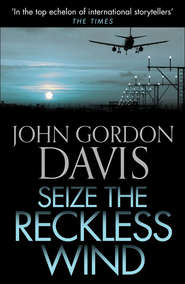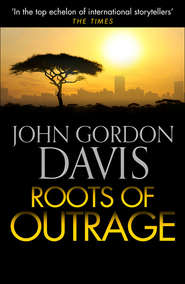По всем вопросам обращайтесь на: info@litportal.ru
(©) 2003-2024.
✖
The Land God Made in Anger
Автор
Год написания книги
2018
Настройки чтения
Размер шрифта
Высота строк
Поля
The white man snatched it. He drank feverishly, his eyes never leaving them. He swallowed and swallowed, and the two men watched him fearfully. He drank the bottle dry, then threw it down. He held out his hand for another. It was given to him. He drank half of it. Then he said:
‘Swakopmund!’
The Damaras understood. Neither of them had ever been to the white man’s town faraway to the south, but they had heard about the extraordinary place at the mouth of the river which is almost always dry. The Damara who was called Jakob pointed down the hostile coast.
The white man picked up their bows and motioned them to start leading the way.
In less than an hour he knew it was hopeless: he had to struggle to keep up, and tonight, when he fell asleep, the two men would disappear. He could not afford to leave witnesses, and when the sun began to get low he decided to kill them so that he could throw himself down and sleep. First, however, he wanted them to make a fire.
There was plenty of driftwood. He called a halt, and motioned them to put their slingbags at his feet, before indicating that he wanted a fire. The Damaras set to work. The white man collapsed in the sand. He opened one of the slingbags and found dried meat, which he began to chew ravenously.
The two Damaras made the fire. Jakob took a straight stick, the size of a pencil, out of his bag, and a piece of flat wood. He put a pinch of sand on the very edge of the wood, and some kindling underneath. Then, holding the straight stick vertical, he rubbed it between his palms onto the sandy wood, very hard, until the friction caused smoke. A tiny glow fell off the wood into the kindling below. The other Damara, called Petrus, blew on it, whilst Jakob ground the stick, and the kindling blossomed into a little flame. They scuttled about on their haunches, getting more kindling, crouching to blow. Then Petrus suddenly gave a gasp and pointed down the beach; the white man turned to look, and Jakob hit him.
Jakob seized a piece of jagged wood and swung it with all his might and the white man flung up an arm. The wood crashed against his wrist and gashed it to the bone, and he sprawled. His wallet jerked out of his pocket and the gun went flying. Jakob bounded and swiped the man’s mouth, and his lips split and his front teeth smashed off at the roots. Jakob raised his club again and the man cried out, trying to cover his head. Jakob threw down the stick and snatched up his slingbag, and Petrus snatched up the bows and the man’s wallet. They ran away into the dunes, leaving one slingbag behind in their panic.
A thousand miles down the Skeleton Coast is the Cape of Good Hope, ‘The Tavern of the Seas’ on the route from Europe to the East, with its oaks and its vineyards and its fruit – the Fairest Cape of All, it is said. Further to the east are the mighty Tsitsikama forests, and then come the rolling hills of the Ciskei and the Transkei, the homelands of the Xhosa people beneath the mountain stronghold of Lesotho, the kingdom of the Basuto people; then come the lush green hills of Natal where the sugar cane grows, the home of the Zulu people, who were a mighty warrior nation. Then across the magnificent towering Drakensberg mountains lie the farmlands of the Orange Free State, the vast highveld and the bushveld of the Transvaal, the land of rich goldfields, the strongholds of the hard people of Dutch descent, who are called Afrikaners. They live surrounded by many tribes: the Swazis in their mountain kingdom, the Tswanas, the Vendas, the Matabele. To the west of this country is the Kalahari desert and beyond that lies the vast desert country called South West Africa-Namibia, with its Skeleton Coast, where live the Ovambo people, and the Himba and the Herero, the Damaras and the Bushmen, to name but some, as well as Germans and Afrikaners. There are many different countries in this dramatic land of southern Africa, with many different climates, and many different peoples, and many languages and many different customs, but the most dramatic country of all is the one known as The Land God Made in Anger, the desert land called South West Africa-Namibia, or more commonly simply Namibia, where this story began.
Legally, Namibia is not part of the Republic of South Africa. It is a former German colony which was handed to South Africa by the League of Nations at the end of the First World War under a mandate to govern in the best interests of the natives until such time as it was appropriate to grant the colony independence. Halfway up is the little enclave of Walvis Bay, the only deep-water harbour in the whole vast coast, which is legally part of South Africa. It was to this unusual part of the world that James McQuade came back forty years after Jakob and Petrus saw the two men erupt out of the sea and fight to the death on the burning shore.
James van Niekerk McQuade once served twelve months in prison for contravening the Immorality Act, but do not be too alarmed by that because it happened like this: in those days, when he was starting a trawler-fishing company in Cape Town, he sailed to the Antarctic every year on the whaling fleets to make extra money, and down at the Ice he fell madly in love with the ship’s nurse, a South African girl who happened to have some Malaysian blood. She was only one-sixteenth Malay, but that was enough to make her a Coloured under South Africa’s laws in those days. When they got back from the Ice she was pregnant and he unlawfully married her. When they were charged for breaching the racial laws, he packed her off secretly to England to have her baby. The magistrate sentenced him to twelve months imprisonment with hard labour, and he never saw his wife again. She wrote to him in prison saying that she had miscarried, that she had ruined his life and that he should forget about her. There was no address. When he came out of prison he moved his fishing company to Walvis Bay to get away from his wicked past, put a skipper in charge and hurried to England to look for his wife. After six months he had given up and emigrated to Australia to start life again, an embittered man. No way was he going to go back to goddam South Africa.
Nor did he, for twelve years. He hated the place. Not the country – for it is a wonderful country – but the government with its Apartheid laws. But he still had connections with South Africa. There was his house, which returned a reasonable rent, mortgaged to pay for his trawler, and there was his fishing company, which most years showed a reasonable profit. While in Australia, he had formed Sausmarine, a small, one-freighter shipping line that plied between Australia, South Africa and Ghana, a route that became profitable when the Australian Dockworkers’ Union refused to off-load South African cargo. Australian businessmen document their cargo as bound for Ghana, and your understanding Sausmarine off-loads it in Cape Town. And vice versa. You’d never believe the mistakes these shipping clerks make: South African exports get misloaded into crates bearing Ghanaian labels. (Sausmarine never went near Ghana – her ship was called Rocket because she did the putative trip so fast.) And to make confusion more confounded, Sausmarine was registered in Panama. But, during all those years, McQuade did not sail to South Africa: Kid Childe, Tucker and L. C. Brooks ran the ship, and McQuade ran the company from a one-roomed office above a Greek café on the Adelaide waterfront. It was not bad business until sanctions against South Africa heated up and the competition with other sanction-busters became too sharp. McQuade had not the slightest compunction about beating the Dockworkers’ Union at their own commie game, but he drew the line at more prison. Finally he decided to sell up Sausmarine, go back to South Africa and work the fishing company hard with a skeleton crew, then sell it and put the money into a small passenger ship to ply down the Great Barrier Reef, from Cairns to Sydney. That’s a lovely part of the world, and there was a crying need for that service.
There was another good reason for getting his investments out: called 435. United Nations’ Resolution 435 ordered South Africa, the polecat nation of the world, to grant independence to South West Africa-Namibia. For years South Africa had been fighting a war with SWAPO, the South West African Peoples Organization, a terrorist Marxist movement, and had no intention of handing the country over to them: but now SWAPO had thirty thousand Cuban soldiers to help, and McQuade saw the writing on the wall. The same writing that had spelled out the collapse of Rhodesia and the Portuguese colonies and the Congo and the rest of British Africa: you win every battle but lose the war. God knows McQuade had no love for the South African Government but he had much less love for communists, and certainly no desire to fish in their territorial waters. So – sell up whilst the going was still good, and wash his hands of goddam Africa forever.
That is how James McQuade was feeling when he walked off the tarmac into Jan Smuts Airport in Johannesburg and heard South African accents again. Ivor Nathan was there to meet him, looking as much like Groucho Marx as ever. They had been at university together. Nathan gave him a bed for the night and tried to cheer him up: South Africa wasn’t as bad as it used to be, Nathan said, Apartheid was unenforced almost everywhere now, except in the rural districts where the Hairybacks still thought the world was flat. ‘But it’s all still on the bloody statute book,’ McQuade said.
‘The Sex Laws have been repealed,’ Nathan said. ‘The Immorality Act and the Mixed Marriages Act. The government is trying to reform but it daren’t repeal them all at once, for fear of a backlash, but give them time, my boy, my life.’
‘Just another decade or two?’
‘Well, we’ve got a Coloured House of Representatives now, and an Indian House of Delegates. I tell you, things are changing.’
‘But no Black House. It’s all too little too late. And what about this right-wing AWB mob, stomping around with their bloody swastikas and armbands?’
‘Lunatic fringe,’ Nathan said.
‘They don’t sound so fringe in the overseas press! It sounds as if the whole country’s turned Nazi.’
‘Lunatic fringe,’ Nathan insisted.
McQuade sighed. ‘Anyway, what about the war on the border – that’s my problem. What about 435? Is South Africa going to grant independence to Namibia? That’s the question. If so, the fishing industry goes down the communist drain and I’m bankrupt.’
‘No way is South Africa going to implement 435 as long as the Cubans are there, and no way is Castro going to withdraw them because he wants to go down in history as the Scourge of the Afrikaner. Independence is a hell of a long way off, so your fishing’s safe for a long time.’
‘Is it, hell. The fleets of the world are out there raping the Benguela current because South Africa daren’t enforce Namibia’s two hundred-mile maritime belt because of goddam 435.’
Nathan sighed. ‘What’s Australia like?’
‘Australia’s great,’ McQuade said, ‘and it’s got no Black Problem.’
‘Because the Aussies shot most of them. At least we were Christians.’
‘We? You’re a closet Goy, Nathan.’
‘Once a South African, always a South African.’ Nathan sighed. ‘You can’t expect too much of us.’
The next day McQuade flew to Cape Town. Even beautiful Table Mountain rising up seemed to be only a monument to Afrikanerdom, and God he was glad he was washing his hands of the lot of them. He was an Australian now. He checked his house. He felt no pangs when he saw the nice old place, and he was glad he was getting rid of it. He visited half a dozen estate agents. Then he bought an old Landrover. That afternoon he set off, driving north, out of the beautiful vineyard country with its grand old Dutch architecture, heading for the Orange River and South West Africa-Namibia beyond, the Land God Made in Anger.
You probably don’t know that bridge over the Orange River. The road curves down out of the dry, stony hills at Vioolsdrift where there is a general dealer’s store, a gas station and a police post. Then suddenly there is the river, the water muddy orange, a belt of green, then the flinty desert rising up beyond: hot, hard, dry as hell. McQuade saw nothing beautiful in that desolate vista, but when he was halfway over that river he felt his depression lift. Man, this was dramatic country, he had forgotten how magnificently dramatic it was. And the Republic of South Africa was officially behind him and there was a feeling of youthfulness on this side of the river, a frontier feeling of wide open spaces, as if the long arm of Pretoria had to pull its punches here because of 435, and everybody knew it. He stopped at Noordoewer, which is a little hotel on the other side. There were a score of Coloureds squatting around, doing nothing. He filled up with diesel and drank a row of cold beers, and the Afrikaans words he had not used for twelve years came flooding back to his tongue without thinking: and, by God, it was a strange but nice feeling. These were people he just naturally knew and understood, and he almost felt like an African again.
He bought a six-pack of beers and set off north again. And there was nothing beautiful in that flat, hard, grey-brown desert stretching on and on, blistering hot, and maybe it was the beer he was drinking as he drove, but he found himself almost happy, and it almost felt as if he was coming home. At Keetmanshoop he turned west, towards Lüderitz on the faraway Atlantic, and now he was driving through thorn-tree country with sparse yellow grass, and he saw wild horses and ostriches. Near Aus he turned north again, through the vast cattle country, ranches thousands of square kilometres in size. That night he slept beside his Landrover, under the stars, near the oasis called Sesriem, where the creeping sand dunes are three hundred feet high and change colour from pink to mauve to apricot to gold in the shifting light. Maybe it was because of all the beer, but it seemed there is no feeling like an African night, no stars so bright, no night sounds so intimate and significant, no smell and light of fire so true to life. And even the next afternoon, when he came grinding down out of the hot hard hills of the Namib desert onto the vast sand-duned plains, and then the distant hostile Atlantic began to show through the shimmering haze, until finally, the flat white smudge of Walvis Bay, one of the drabbest ports in this world, began to coagulate in the distance – even then he still felt better about coming back. As Nathan had said: ‘Once a South African, always a South African – you cannot expect too much of us.’
PART ONE (#ulink_9a768279-8d6d-54c8-913b-c24dd15b589a)
1 (#ulink_62bc6dcf-de73-5d59-a741-4158e7daf95a)
Nowadays, beyond the cold horizon, the Atlantic is lit up like a fairy land at night with the fishing fleets from around the world raping the icy Benguela current; the Russians, the Japanese, Norwegians, Spanish, Portuguese, the South Africans, all with the most sophisticated gear, and factory ships for refrigeration. The South African boats bring their catch back to Walvis Bay, and the smell of fish hangs like a cloud. Yet it is said that you only cry twice in Walvis Bay: the day you arrive, and the day you leave. McQuade couldn’t understand it: the town was an eyesore, row upon row of squat, drab dwellings with corrugated iron roofs standing in dismal plots of desert sand, stretching back from the odiferous wharfs and the railway line. The shops are aggressively unattractive, and the sand blows down the streets and banks up in the gutters. Forty kilometres up the coast, beyond the enclave’s invisible borders, is the town of Swakopmund, with old Bavarian architecture, elaborate old public buildings and homes and nice hotels with gemütliche bars with flowering, shaded courtyards under the desert sun. Both sun-blistered towns were built at the same time, at the start of this century: the difference being (according to McQuade) that Swakopmund was built by real Germans with culture behind them, whereas Walvis Bay was built by Afrikaners who had been detribalized from Europe for three hundred years. Yet he was always happy when he saw the flat, drab port come up over the horizon and he felt an extraordinary affection for the place. Maybe that was because anybody would be happy coming back after four weeks on the heaving Atlantic, or maybe it was the steamy thighs of the Stormtrooper awaiting him – (‘When will you marry me, you englisches Schwein, you cad, you unspeakable bounder?) (‘Liebchen, I’m still married.’) (Liar …) Or maybe it was the magnificent desert. But it was more: there was a colonial youthfulness about this ancient land, a sense of optimism, a comradeship amongst its people, almost a conspiracy against the heavy hand of faraway Pretoria. He had been back two years and the company was still in debt, but although it was still the plan to sell up as soon as possible, go back to Australia and start that passenger line, till then he was glad he had come back to Africa. That is how McQuade was feeling that afternoon of the 20th April as his trawler, Bonanza, came churning through the oily harbour of Walvis Bay to off-load her refrigerated catch, and give the crew a few nights’ shore-leave. He tied the Bonanza up alongside the Kuiseb wharf, where he always sold his fish, and left Potgieter in charge while he went to the bank to draw some money for the Coloured crew.
McQuade and Tucker and the Kid and Elsie went uptown in the Kid’s new car. The Kid’s real name was Nigel Childe and he used to be a captain-gunner in the All England Whaling Company fifteen or more years ago. His father had been chairman of the board and the Kid had come into a lot of money, but he had spent most of it before McQuade persuaded him to invest in Sausmarine. The Kid could not afford this new car, but said that he could not afford to do without it either on account of he was now forty years old, a sombre anniversary for a hedonist, and he was madly in love with his wife, Beryl the Bitch, who was always threatening to leave him; while he was at sea, she prepared long memoranda of her grievances. Today the Kid was hurrying uptown to the dentist to have his new smile fitted, which he could also ill-afford, as a surprise for Beryl: last month the dentist had filed his upper teeth down to points and fitted temporary caps while his smart permanent ones were being made, and now he wished he’d kept his own old ones. Hugo Tucker was the ship’s engineer, the smallest ex-shareholder in Sausmarine, and he could play the mouth organ, music as mournful as his countenance. Tucker was always worried, often about the Bonanza’s engines, mostly about his own money, and always about his wife. He was a South African but married to Rosie, an Australian who used to earn her very own money as a dress-maker in Adelaide – and now where was she? – broke in fucking Walvis Bay! From heaven to hell in one airline ticket, and all because of McQuade, the Kid and Elsie and their hare-brained schemes. Elsie’s real name was L. C. Brooks, the ship’s cook and book-keeper, who had been with McQuade and the Kid on the whalers in the old days. Elsie did not have woman-trouble because he did not like women but now that he was over fifty he had given up the other way too. ‘There’s nothing more pathetic than an ageing queer,’ Elsie said, ‘I’ll just bite the bullet and grow old gracefully.’
They all got into the Kid’s new car. It was a Renault and he called it Rene because it was electronically programmed to speak to him. ‘Bonjour, Rene,’ the Kid said as he switched the ignition on.
Rene said: ‘Fasten your seat belts please.’
‘You heard him,’ Kid said, ‘fasten your bleedin’ seat belts before he calls the gendarmes.’
Rene said: ‘Oil pressure is satisfactory.’
‘Merci, Rene,’ Kid said.
‘Water pressure is satisfactory.’
‘Merci, Rene.’
‘All systems are satisfactory.’
‘Merci, Rene.’ He put the car into reverse.
‘Release your handbrake,’ Rene requested.
‘What happens if you actually drive off with your handbrake on?’ Tucker asked with morbid professional interest.
‘He screams Mon Dieu, mon Dieu! and heads straight for the AA.’
They drove out of the sandy compound, into Oceana Road. There were big oil tanks and acres of container-yards on the raw desert shore, and the sand lay across the tarmac road in thick streaks and ridges. They drove past the fishing compounds and the Kid said mournfully, ‘At least you’ll grow old gracefully with your own teeth to bite the bullet with, Elsie.’
‘But why did you do it?’ Elsie complained.






